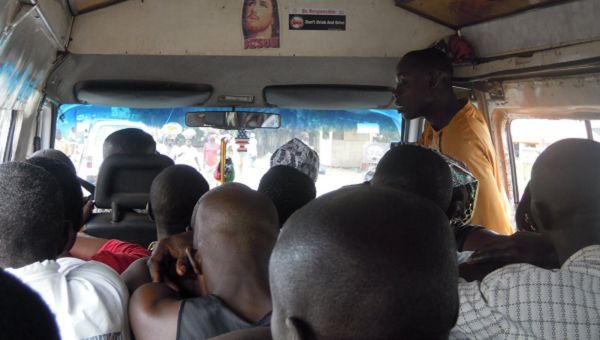Few days ago, I boarded a bus from Nungua to the Kwame Nkrumah Interchange, my usual route.
As I hurled myself into the bus after covering a 600-metre journey by foot under the scorching sun, the sweat that trickled down my chin onto one of the seats was predictable.
In my long-sleeved shirt, I could feel the flow of sweat from my neck to my waist.
To worsen the situation, my handkerchief was nowhere to be found when I tried to remove it from my pocket in an attempt to wipe my face.
Lo and behold, when I looked up to the ceiling, there hanged three separate packs of tissue made available to passengers.
In total disbelief about such a VIP treatment in a trotro (popular name for mini-buses used in public transportation), I did not hesitate to wipe the heavy moisture on my face.
The relief offered me by the operators of the bus with registration number GT 4952 – 17 has given me reason to urge other public transport operators to offer their customers better services.
State of our trotros
Millions of Ghanaians, including some members of the middle class depend on public transport on a daily basis to facilitate their movement to and from work, school, market, church among other destinations.
For a country that has not invested much in railway transport, city bussing and other rapid transit and ferries, the mention of public transport has almost become synonymous to taxis or some cargo buses that are imported into the country and are re-fitted with locally made seats and other installations to make them “conducive” for transporting passengers.
Although such vehicles have conventionally become the “authorised” means of public bussing in the country which accounts for about 60 per cent of passenger movement and employing thousands of operators in the transport industry, it is ironical that it is rather the sector that has received the least attention in terms of supervision and improved services.
Today, it is very common to come across hundreds of rickety trotros that have outlived their usefulness, parading every nook and cranny of the capital city to the discomfort of passengers.
Such vehicles, like those that operate on the Accra-Kaneshie-Odorkor stretch, either have hanging doors, poor ventilation, broken ceiling, half-covered engines among other unpleasant characteristics that pose a threat to the safety of passengers.
Some of them would make good market in scrap dealership.
There are no spaces between the seats to give passengers more room.
Although fire extinguishers are mandatory for all vehicles, I have not sighted (at least for the past one month that I took an interest in checking) a single commercial bus that has at least one extinguisher fixed in it to curtail fires.
I found it dangerous when a conductor on my daily Nungua-Kwame Nkrumah interchange route, metamorphosed into a commercial bus driver in one day.
It is high time attention was paid to the things that would ensure public safety.In February this year, a sprinter bus crashed into a concrete pillar on the Achimota-Ofankor Highway in broad daylight, killing four passengers on board.
Elsewhere, commercial drivers are taken through rigorous training and tests for months before lives are entrusted in their care.
Need for change
We must appreciate that the lives of Ghanaians revolve around the use of commercial transport. There is the need to prioritise better customer service for patrons as it pertains in other commercial entities.
Prioritising a better customer service is to uphold the safety of the passenger at all times.
It involves the use of robust and attractive vehicles, regular maintenance of vehicles, observing sanitary practices at all times (for example cleaning the vehicle after each trip), installing safety gadgets such as fire extinguishers, among other safety pactices.
Most importantly, it involves the assessment of the health and mental backgrounds of all commercial drivers before precious lives are entrusted in their care.
• The writer is a National Service person with the Daily Graphic

